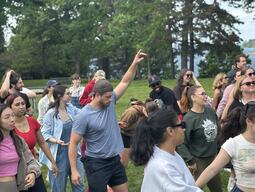
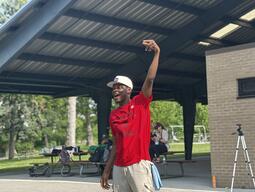
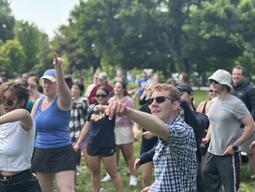
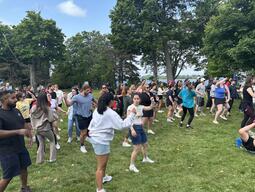
What do dance, environmental justice, and teacher education have in common? As it turns out, more than you might think.
We sat down with Chris Szymus, the new Physical Education curriculum instructor for the Primary/Junior teacher candidates at the Faculty of Education. An alum of the very same Primary/Junior program and a former student of beloved faculty member Shelley Mulrooney, Szymus described stepping into this role as “a lot of fun” and spoke warmly about the positive energy and passion of his students. When he introduces himself as “the new Shelley,” people instantly understand his role — a testament to her legacy and the culture she cultivated in the Primary/Junior stream.
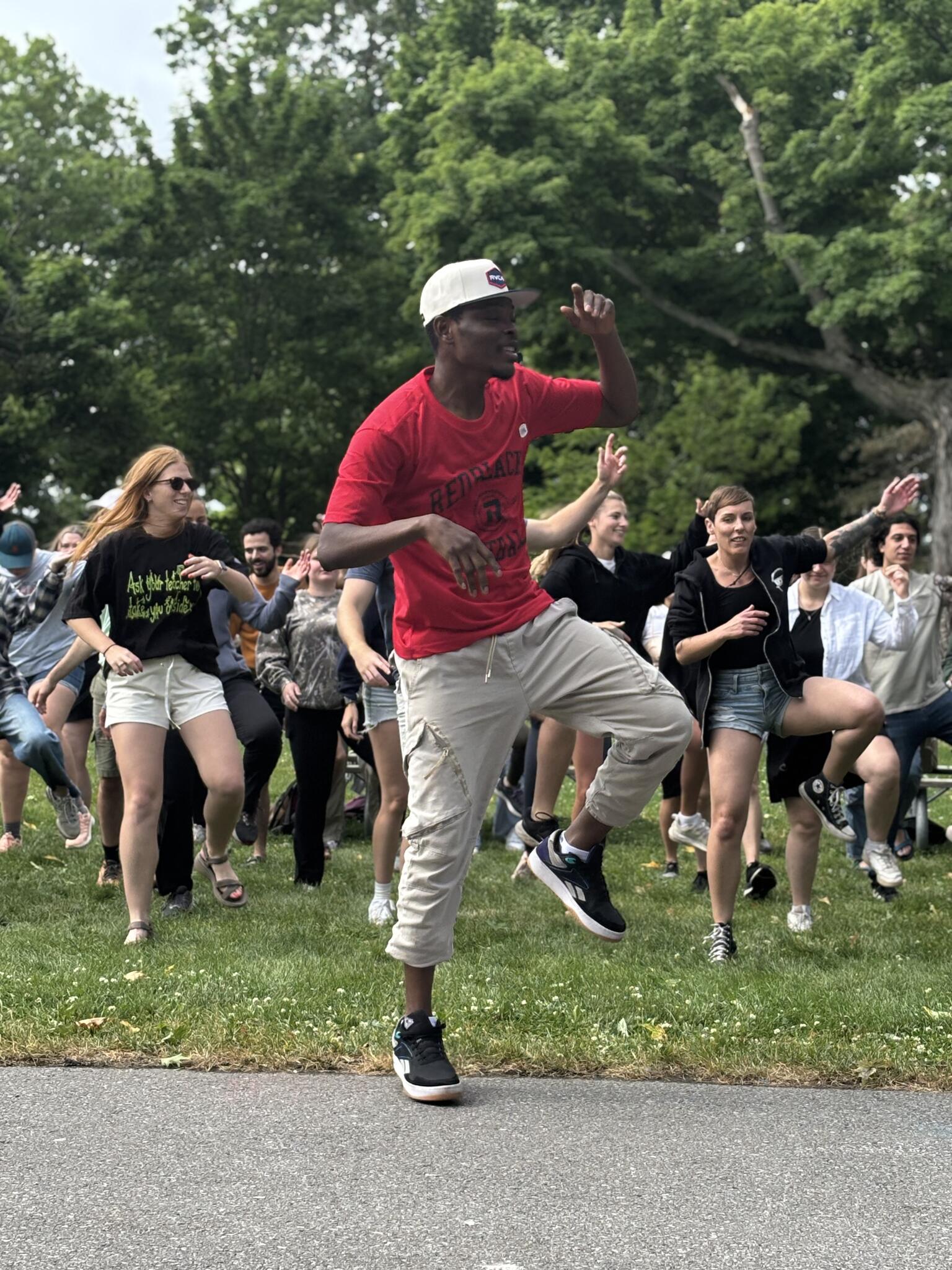
Now a teacher with the Algonquin and Lakeshore Catholic District School Board (ALCDSB) and a youth sports coach, Chris connected with the Centre for Community Engagement and Social Change (CCESC) earlier this year in his role as an adjunct faculty member to apply for the Visiting Scholar and Guest Speaker Fund. This initiative supports educators and researchers in bringing guest experts and community-engaged perspectives into teacher education, enriching learning through lived experience, professional insight, and critical dialogue.
Speakers funded through this opportunity are expected to deliver at least one presentation, workshop, or session at the Faculty of Education that complements or extends existing faculty expertise. We enthusiastically welcome diverse voices and forms of knowledge to support more inclusive, engaged, and practice-informed teacher education.
Inspired by past Primary/Junior dance curriculum workshops led by Dictus Mattson — a Ghanaian dance practitioner and researcher known for teaching the Azonto style — Chris wanted to invite him back. Dictus’s infectious energy and joy have left a lasting impression on teacher candidates over the years – myself included.
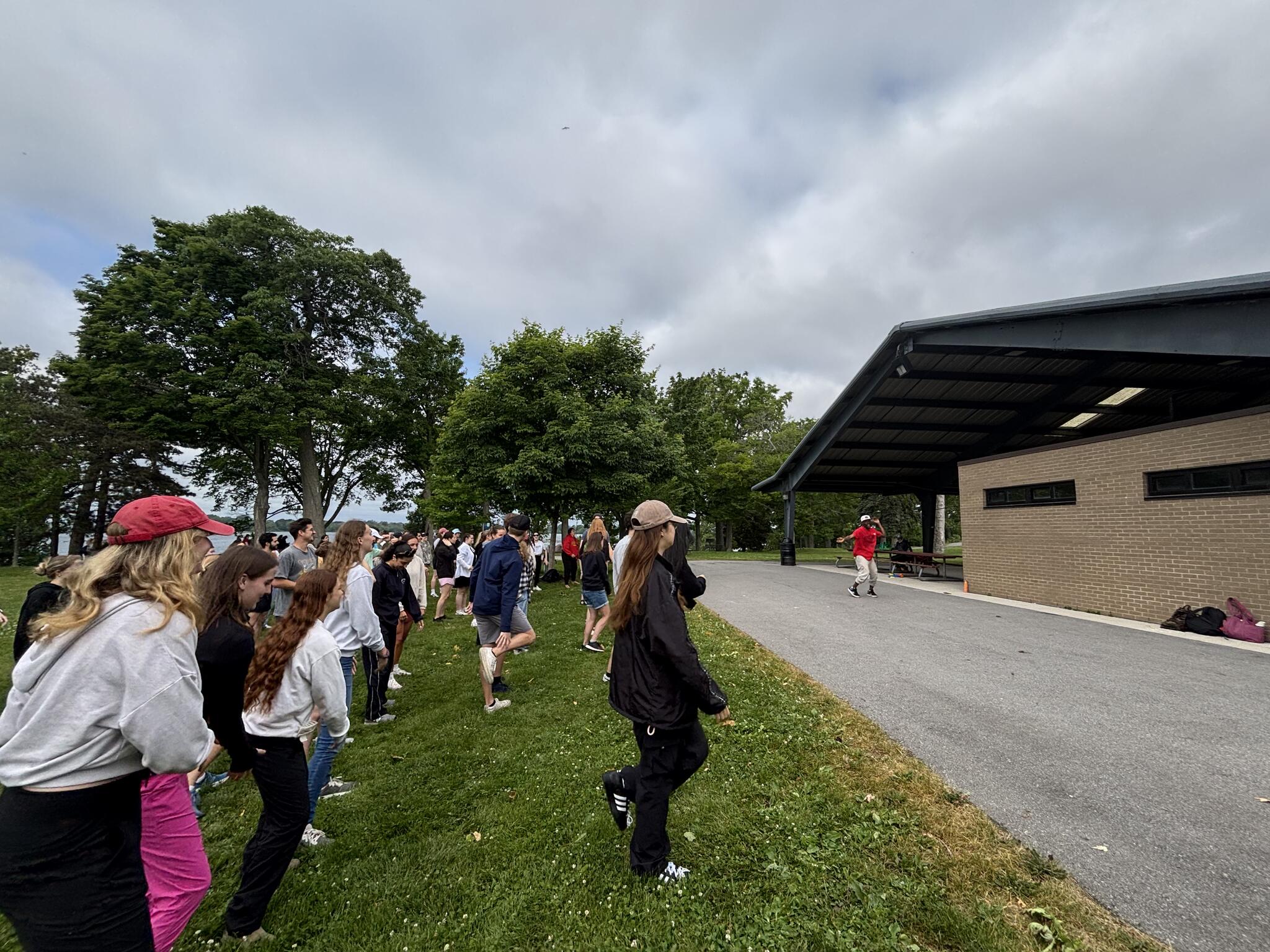
Environment Day
Each year, the Faculty hosts Environment Day, an experiential, cross-curricular event that integrates three BEd program courses: PROF 503 Environmental Education; PROF 502 Introduction to Indigenous Studies for Teachers; CURR 390 Primary/Junior Dance.
Originally started by Dr. Zabe MacEachran (Coordinator of the Outdoor & Experiential Education track), this year’s event was co-organized by instructors Becca Evans, Liz Beattie, Carleigh Milburn, and Chris Szymus. This year, the team also welcomed Elder-in-Residence Deb St. Amant to facilitate a session on Indigenous knowledge and pedagogy.
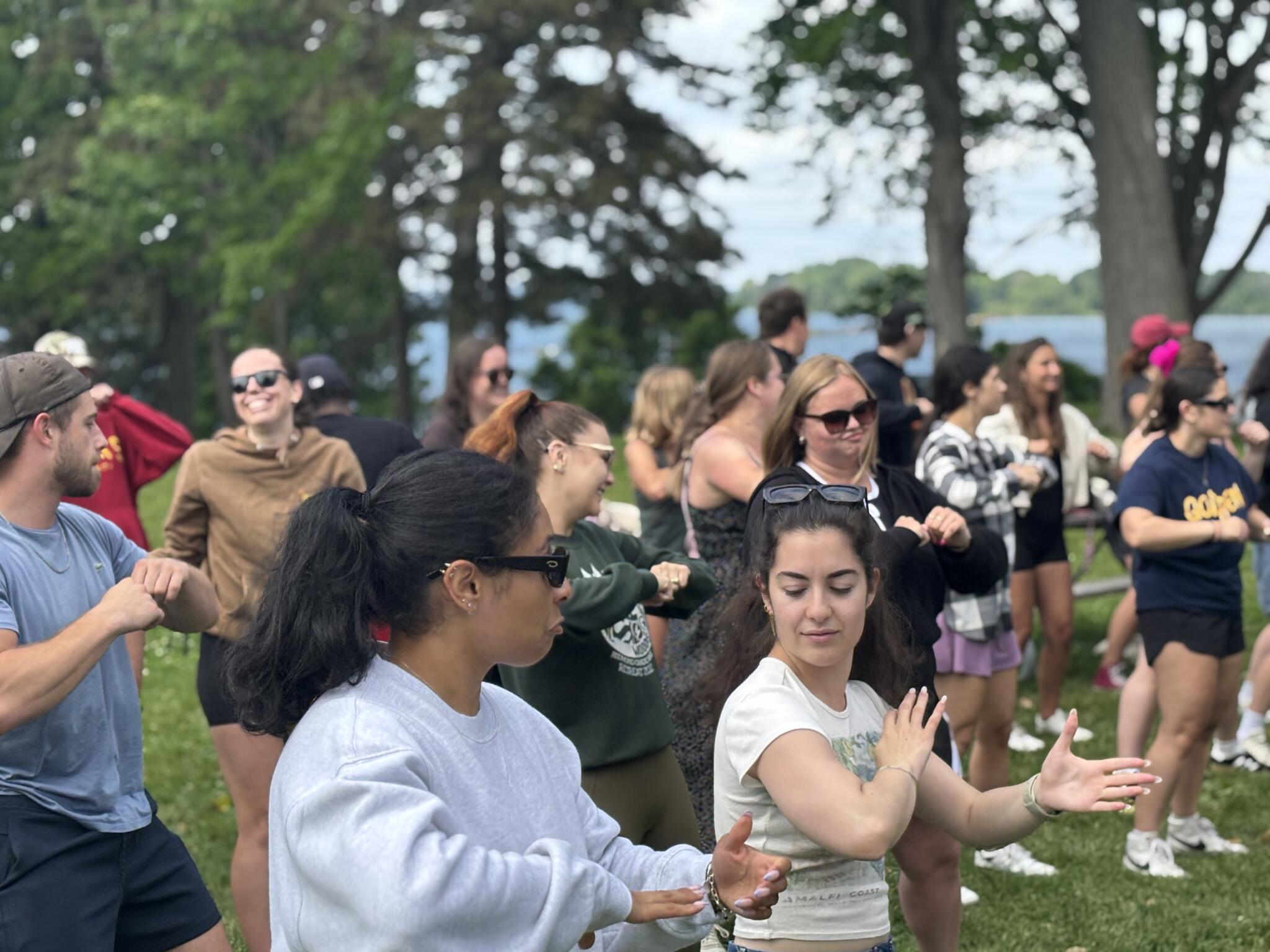
Bringing Afrobeats to the Park
On Friday, June 20, this year’s Environment Day brought over 400 teacher candidates to Lake Ontario Park for a day of experiential learning. Thanks to the generous CCESC funding, Chris was able to bring Dictus in as a community artist to lead a workshop titled “The Origins of Afrobeats.” The session included a warm-up, a 30-minute dance class, and spirited dance-offs where students enthusiastically faced off against one another.
Far from a typical movement workshop, Dictus’s session offered a vibrant and embodied way to connect with the local community. Chris noted that the entire CCESC grant was used to compensate Dictus according to CARFAC (Canadian Artists Representation) standards, ensuring fair pay for artistic work.
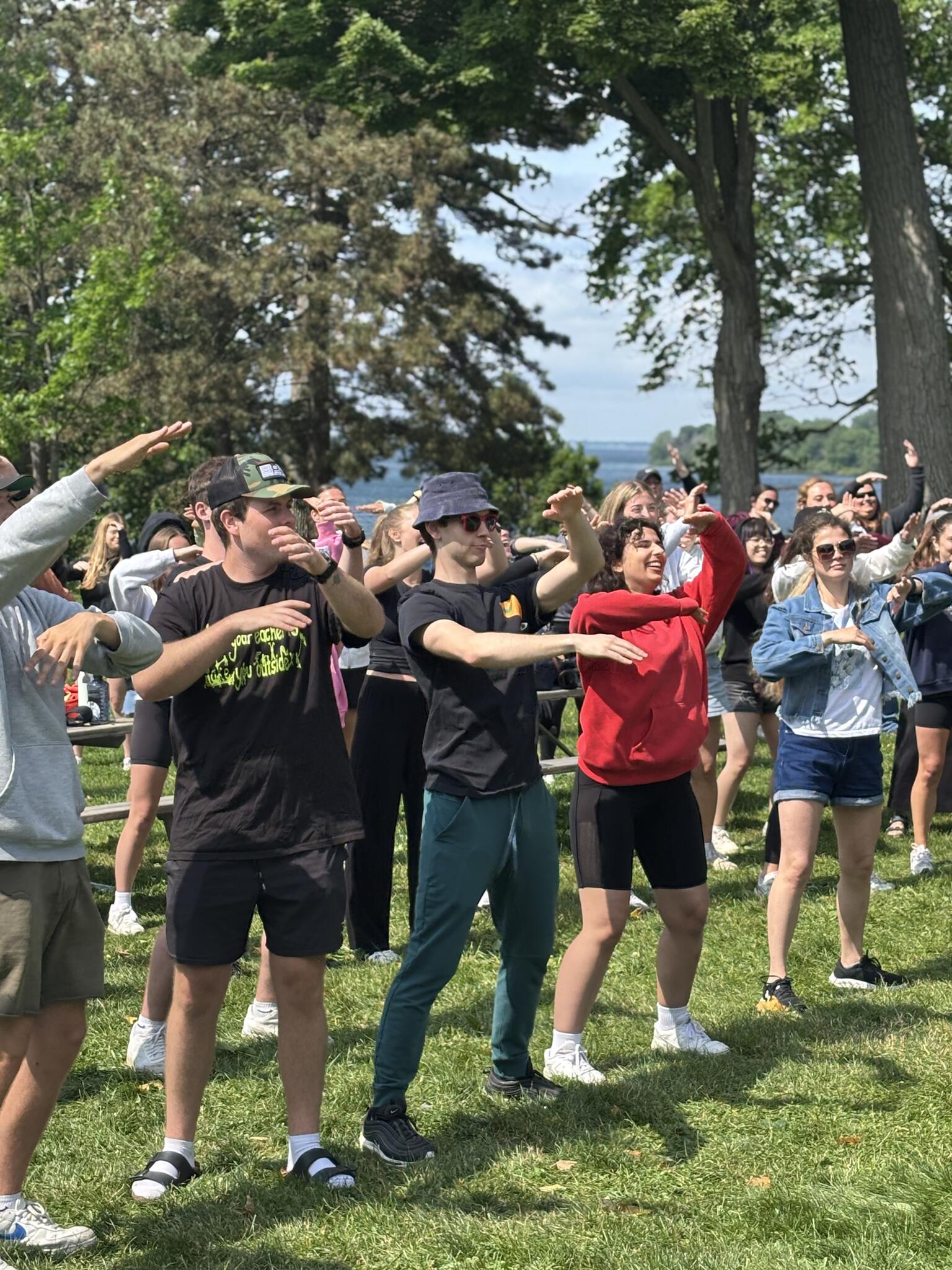
The impact was immediate and widespread. Students across divisions—particularly those in the Intermediate/Senior stream who don’t typically work with the dance curriculum — shared overwhelmingly positive feedback. Some said, “I don’t dance, but I’ve been doing that dance every day since.” Chris’s personal highlight? Watching a group of elementary students, visiting the park on a year-end trip, join in with their teachers from the nearby splash pad. The contagious joy of the session brought everyone together. By the end, every single person was dancing.
In many African dance traditions, the phrase “do your face something” is a culturally rooted way of encouraging dancers to express emotion, presence, or spirit through facial expression, not just physical movement. With Dictus’s encouragement, participants did just that—smiles wide, energy high, and movements alive with spirit.
Community Engagement in Action
When asked how he defines community engagement in the context of teacher education, Chris emphasized its centrality to the profession. For him, it’s about connecting what happens in the classroom with the broader community—inviting in diverse perspectives and leveraging shared knowledge to enrich teaching and learning. He proudly explained that everybody has different experiences and skills that can be used to better our collective practice. Chris hopes to continue building these bridges. For teacher candidates who stay in Kingston, these experiences foster long-term community connections. For those returning to their home communities, the hope is that they take with them a deeper understanding of why local engagement matters—and how to build it.
If given the opportunity to pursue a similar initiative in the future, Chris would be eager to incorporate adaptive sports, such as wheelchair dance. Earlier this year, students from the Primary/Junior stream had the opportunity to learn wheelchair basketball through a collaborative partnership with Queen’s Athletics. These types of experiences offer meaningful, hands-on opportunities to engage with inclusive and adapted physical education—experiences that will pay dividends through the many students these future educators will teach and inspire throughout their careers.



